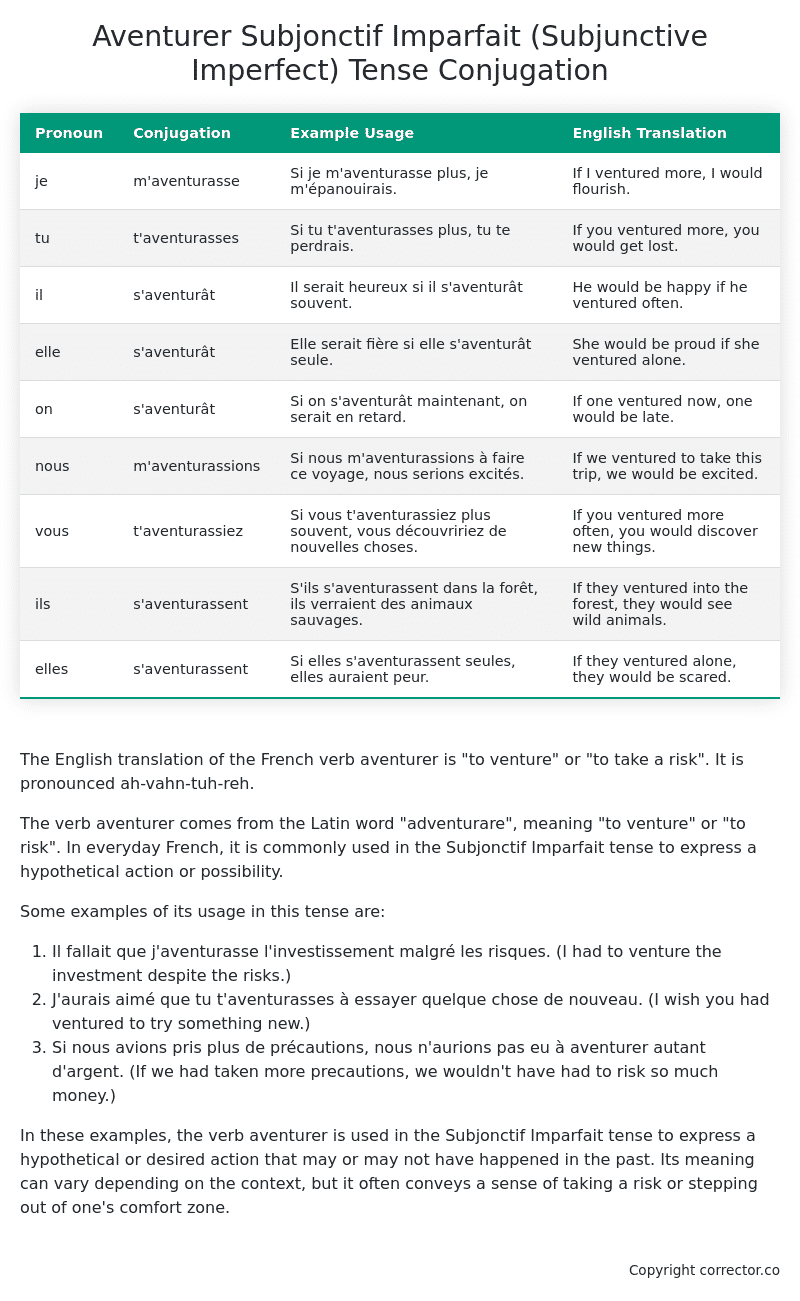Subjonctif Imparfait (Subjunctive Imperfect) Tense Conjugation of the French Verb aventurer
Introduction to the verb aventurer
The English translation of the French verb aventurer is “to venture” or “to take a risk”. It is pronounced ah-vahn-tuh-reh.
The verb aventurer comes from the Latin word “adventurare”, meaning “to venture” or “to risk”. In everyday French, it is commonly used in the Subjonctif Imparfait tense to express a hypothetical action or possibility.
Some examples of its usage in this tense are:
- Il fallait que j’aventurasse l’investissement malgré les risques. (I had to venture the investment despite the risks.)
- J’aurais aimé que tu t’aventurasses à essayer quelque chose de nouveau. (I wish you had ventured to try something new.)
- Si nous avions pris plus de précautions, nous n’aurions pas eu à aventurer autant d’argent. (If we had taken more precautions, we wouldn’t have had to risk so much money.)
In these examples, the verb aventurer is used in the Subjonctif Imparfait tense to express a hypothetical or desired action that may or may not have happened in the past. Its meaning can vary depending on the context, but it often conveys a sense of taking a risk or stepping out of one’s comfort zone.
Table of the Subjonctif Imparfait (Subjunctive Imperfect) Tense Conjugation of aventurer
| Pronoun | Conjugation | Example Usage | English Translation |
|---|---|---|---|
| je | m’aventurasse | Si je m’aventurasse plus, je m’épanouirais. | If I ventured more, I would flourish. |
| tu | t’aventurasses | Si tu t’aventurasses plus, tu te perdrais. | If you ventured more, you would get lost. |
| il | s’aventurât | Il serait heureux si il s’aventurât souvent. | He would be happy if he ventured often. |
| elle | s’aventurât | Elle serait fière si elle s’aventurât seule. | She would be proud if she ventured alone. |
| on | s’aventurât | Si on s’aventurât maintenant, on serait en retard. | If one ventured now, one would be late. |
| nous | m’aventurassions | Si nous m’aventurassions à faire ce voyage, nous serions excités. | If we ventured to take this trip, we would be excited. |
| vous | t’aventurassiez | Si vous t’aventurassiez plus souvent, vous découvririez de nouvelles choses. | If you ventured more often, you would discover new things. |
| ils | s’aventurassent | S’ils s’aventurassent dans la forêt, ils verraient des animaux sauvages. | If they ventured into the forest, they would see wild animals. |
| elles | s’aventurassent | Si elles s’aventurassent seules, elles auraient peur. | If they ventured alone, they would be scared. |
Other Conjugations for Aventurer.
Le Present (Present Tense) Conjugation of the French Verb aventurer
Imparfait (Imperfect) Tense Conjugation of the French Verb aventurer
Passé Simple (Simple Past) Tense Conjugation of the French Verb aventurer
Passé Composé (Present Perfect) Tense Conjugation of the French Verb aventurer
Futur Simple (Simple Future) Tense Conjugation of the French Verb aventurer
Futur Proche (Near Future) Tense Conjugation of the French Verb aventurer
Plus-que-parfait (Pluperfect) Tense Conjugation of the French Verb aventurer
Passé Antérieur (Past Anterior) Tense Conjugation of the French Verb aventurer
Futur Antérieur (Future Anterior) Tense Conjugation of the French Verb aventurer
Subjonctif Présent (Subjunctive Present) Tense Conjugation of the French Verb aventurer
Subjonctif Passé (Subjunctive Past) Tense Conjugation of the French Verb aventurer
Subjonctif Imparfait (Subjunctive Imperfect) Tense Conjugation of the French Verb aventurer (this article)
Subjonctif Plus-que-parfait (Subjunctive Pluperfect) Tense Conjugation of the French Verb aventurer
Conditionnel Présent (Conditional Present) Tense Conjugation of the French Verb aventurer
Conditionnel Passé (Conditional Past) Tense Conjugation of the French Verb aventurer
L’impératif Présent (Imperative Present) Tense Conjugation of the French Verb aventurer
L’infinitif Présent (Infinitive Present) Tense Conjugation of the French Verb aventurer
Struggling with French verbs or the language in general? Why not use our free French Grammar Checker – no registration required!
Get a FREE Download Study Sheet of this Conjugation 🔥
Simply right click the image below, click “save image” and get your free reference for the aventurer Subjonctif Imparfait tense conjugation!

Aventurer – About the French Subjonctif Imparfait (Subjunctive Imperfect) Tense
Formation
Common Everyday Usage Patterns
Interactions with Other Tenses
Subjonctif Présent
Indicatif Passé Composé
Conditional
Conditional Perfect
Summary
I hope you enjoyed this article on the verb aventurer. Still in a learning mood? Check out another TOTALLY random French verb conjugation!


